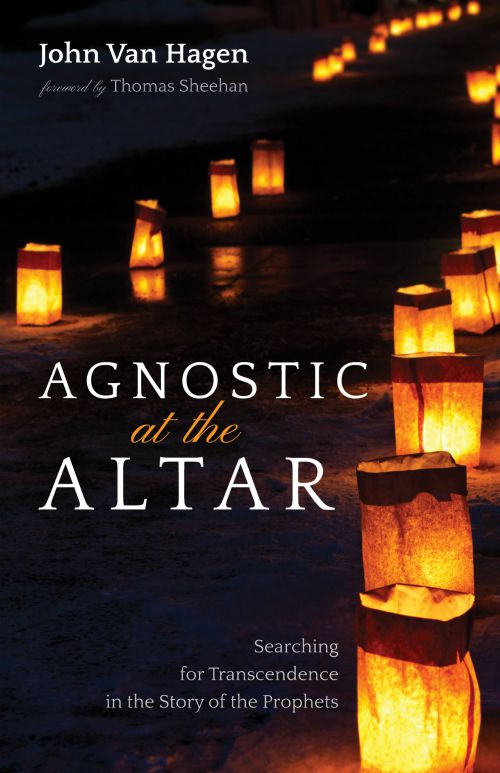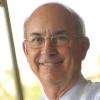
(Unsplash/Aaron Burden)
St. Anselm defined theology as "faith seeking understanding." After reading John Van Hagen's excellent book, Agnostic at the Altar, I think Van Hagen might define his fascinating theological journey as "doubt seeking understanding."
The book takes us back to the prophets of the "Axial Age" (ca. 700-200 B.C.). Drawing upon his years of studying contemporary Scripture scholarship and archeology, as well as his wisdom gained from practicing psychotherapy as a clinical psychologist, Van Hagen unpacks the evolution of prophetic attempts to understand the relationship between God (or as he would say, "the transcendent") and humanity. The prophets "had a grand story that gave hope and meaning in times of crisis and confusion."
He reads and interprets the stories of Elijah, Amos, Ezekiel, Jeremiah and Isaiah (actually the three Isaiahs) grounded in his belief that "agnosticism that both values the transcendent and one's own capacity to think is a buffer against being seized by an other worldly experience that claims too much and discounts the opinion of others."

His treatment of prophets culminates in a chapter on the "Changing Story of Jesus the Prophet." Referencing the work of biblical scholar John Meier, Van Hagen situates Jesus as another Jewish prophet with a powerful story to tell. Here he helps us understand how Paul, Luke and Justin changed the story of the "historical" Jesus in ways that demonstrate that "religion is about story and not history."
Ordinarily I do not suggest that readers read the end of a book first. But in this case, I recommend reading Chapter 8 first because it will give the reader a deeper insight into the "eyes and ears" that Van Hagen uses to engage with the prophets and their compelling storytelling. For it is in storytelling that he discovers humanity's most profound and meaningful efforts to create both individual and community identities and, in the process, find meaning and purpose in life and encounter the transcendent.
For Van Hagen, "the Jewish prophets are representatives of a global, international insistence that our survival as a species depends on our being open to a transcendental vision that offers a way to peace for our world."
As an agnostic, he "doubts whether the being described by the prophets truly exists." At the same time, he values deeply "their insistence that we embrace the power of something larger than ourselves." And he sees in today's world the importance of constructing a new narrative that reflects the wisdom of the Axial Prophets while at the same time acknowledging the discoveries of science and especially the dynamics of evolution. As part of his effort to construct a new narrative, Van Hagen involves himself in a small Catholic parish partly because "the search for transcendence not only fleshes out our identity as spiritual persons but also requires that we practice community."
Advertisement
Even if one does not agree with some of Van Hagen's scriptural exegesis (and/or does not accept some of the authorities upon which he relies), this book provokes important questions that leaders of religious communities and all believers should address.
How do we speak about and understand the "transcendent" in a universe (or multiple universes) that is more than 14 billion years old and is still evolving? What if, as Richard Rohr asserts, Christianity and its understanding of God and humanity, is only in its adolescence?
Who are the prophetic voices of wisdom today? On a grand scale I would suggest theologian and St. Joseph Sr. Elizabeth Johnson. In her book, Creation and the Cross: The Mercy of God for a Planet in Peril, Johnson unpacks the prophet second Isaiah and challenges atonement theology. Others would include St. Óscar Romero of El Salvador and the Jesuit theologians who helped him find his prophetic voice, including Jesuit Frs. Ignacio Ellacuría and Jon Sobrino.
On a much smaller scale, I nominate people like Van Hagen. He suggests that the fear and anxiety we experience in the face of realities like global climate change, income inequality and senseless violence "can be matched by another response to the universe and its mysteries, a response even atheists call spiritual." That response is what Van Hagen calls "awe," and he sees the story of the universe as "awe-inspiring" not just to him but to scientists as well.
Bestselling author Brené Brown is known for her research on vulnerability and her "call to courage." By writing Agnostic at the Altar, Van Hagen has given us an example of what she means. In sharing his spiritual journey, he is at once vulnerable and courageous. And he is prophetic.
[James M. Purcell chairs the board of directors of the National Catholic Reporter.]







